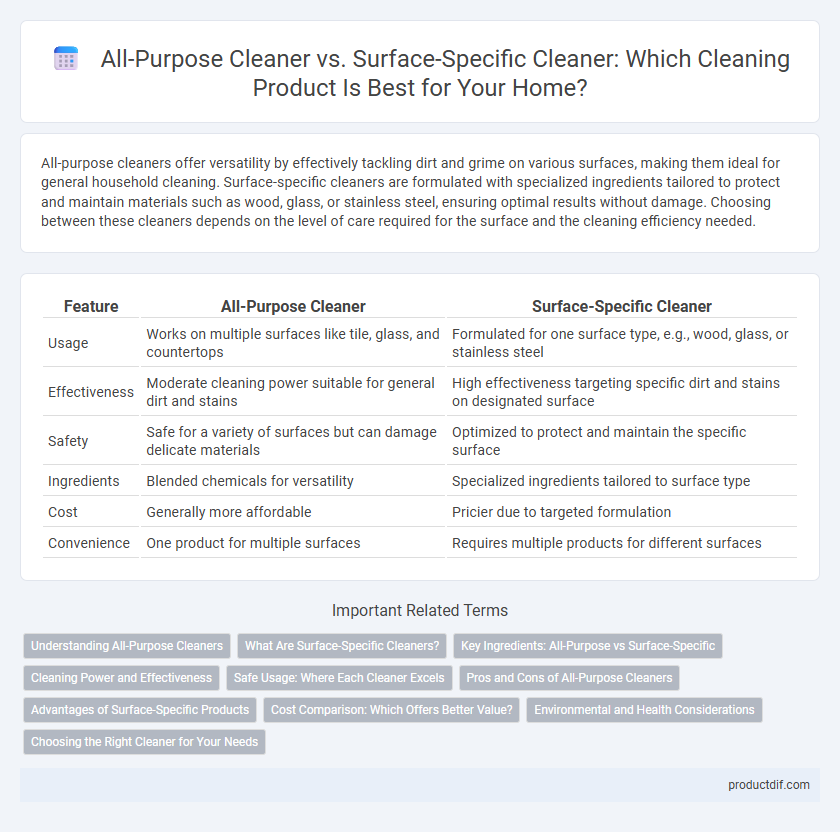All-purpose cleaners offer versatility by effectively tackling dirt and grime on various surfaces, making them ideal for general household cleaning. Surface-specific cleaners are formulated with specialized ingredients tailored to protect and maintain materials such as wood, glass, or stainless steel, ensuring optimal results without damage. Choosing between these cleaners depends on the level of care required for the surface and the cleaning efficiency needed.
Table of Comparison
| Feature | All-Purpose Cleaner | Surface-Specific Cleaner |
|---|---|---|
| Usage | Works on multiple surfaces like tile, glass, and countertops | Formulated for one surface type, e.g., wood, glass, or stainless steel |
| Effectiveness | Moderate cleaning power suitable for general dirt and stains | High effectiveness targeting specific dirt and stains on designated surface |
| Safety | Safe for a variety of surfaces but can damage delicate materials | Optimized to protect and maintain the specific surface |
| Ingredients | Blended chemicals for versatility | Specialized ingredients tailored to surface type |
| Cost | Generally more affordable | Pricier due to targeted formulation |
| Convenience | One product for multiple surfaces | Requires multiple products for different surfaces |
Understanding All-Purpose Cleaners
All-purpose cleaners combine various surfactants, solvents, and detergents to effectively remove dirt, grease, and grime from multiple surfaces such as countertops, floors, and glass. Formulated for versatility, they reduce the need for multiple specialized products while maintaining safe usage across materials like wood, tile, and metal. Understanding their chemical composition and application ensures optimal cleaning performance without damaging delicate surfaces.
What Are Surface-Specific Cleaners?
Surface-specific cleaners are formulated to target particular materials or surfaces, such as glass, wood, or stainless steel, ensuring effective cleaning without causing damage. These cleaners contain specialized ingredients that address the unique properties of a surface, enhancing stain removal, shine, and protection. Using surface-specific cleaners helps maintain the integrity and appearance of delicate or sensitive surfaces compared to general all-purpose cleaners.
Key Ingredients: All-Purpose vs Surface-Specific
All-purpose cleaners contain versatile ingredients like surfactants, solvents, and mild abrasives designed to remove dirt and grease from various surfaces without causing damage. Surface-specific cleaners incorporate targeted agents such as acids for tile and grout, ammonia for glass, or enzymes in wood cleaners to effectively break down contaminants while preserving material integrity. Understanding the chemical composition ensures optimal cleaning performance and prevents surface deterioration.
Cleaning Power and Effectiveness
All-purpose cleaners provide versatile cleaning power suitable for a variety of surfaces, but may lack the specialized formulation needed for tough stains or delicate materials. Surface-specific cleaners are engineered with targeted ingredients that enhance effectiveness on particular materials such as glass, wood, or granite, resulting in superior stain removal and surface protection. Choosing between the two depends on the cleaning task's demands, balancing broad usability against optimized performance on specific surfaces.
Safe Usage: Where Each Cleaner Excels
All-purpose cleaners excel in safe usage for everyday cleaning tasks on various surfaces like countertops, floors, and walls, offering convenience and efficiency without the need for multiple products. Surface-specific cleaners provide enhanced safety and effectiveness by targeting materials such as glass, wood, or stainless steel, preventing damage and prolonging surface life. Choosing the right cleaner ensures optimal hygiene and protection, minimizing harmful residues and ensuring safe environments in homes and workplaces.
Pros and Cons of All-Purpose Cleaners
All-purpose cleaners offer versatile cleaning power on various surfaces, reducing the need for multiple products and saving storage space. However, they may be less effective on specialized stains or delicate materials, potentially causing surface damage or requiring extra scrubbing. Choosing an all-purpose cleaner depends on balancing convenience with specific cleaning requirements and surface sensitivity.
Advantages of Surface-Specific Products
Surface-specific cleaners offer targeted formulations that effectively remove stains, grime, and bacteria without damaging delicate materials like wood, glass, or stainless steel. These products enhance cleaning efficiency by addressing the unique chemical compositions and textures of various surfaces, ensuring better maintenance and longevity. Using surface-specific cleaners reduces the risk of residue buildup and preserves the aesthetic quality of furniture, countertops, and appliances.
Cost Comparison: Which Offers Better Value?
All-purpose cleaners offer better value for households seeking a single solution capable of tackling multiple surfaces, reducing the need to purchase several specialized products. Surface-specific cleaners may cost more upfront but provide targeted cleaning power that can extend the life of delicate materials, potentially saving money on repairs or replacements. Consumers should weigh the frequency of use and type of surfaces cleaned to determine whether the versatility of all-purpose cleaners or the precision of surface-specific cleaners aligns with their budget and cleaning needs.
Environmental and Health Considerations
All-purpose cleaners often contain chemical blends that can release volatile organic compounds (VOCs), impacting indoor air quality and posing health risks with prolonged exposure. Surface-specific cleaners are formulated to minimize harmful ingredients, reducing environmental toxicity and offering safer options for sensitive surfaces and users. Choosing eco-friendly products with biodegradable ingredients supports both environmental sustainability and healthier household environments.
Choosing the Right Cleaner for Your Needs
Selecting the right cleaner depends on the surfaces you need to treat and the type of dirt or stains present. All-purpose cleaners offer versatility and convenience for general cleaning tasks across multiple surfaces but may lack the specialized formulation required for delicate or porous materials. Surface-specific cleaners contain targeted ingredients designed to effectively clean and protect particular materials such as glass, wood, or stainless steel, ensuring optimal results and prolonging surface durability.
All-purpose cleaner vs Surface-specific cleaner Infographic

 productdif.com
productdif.com